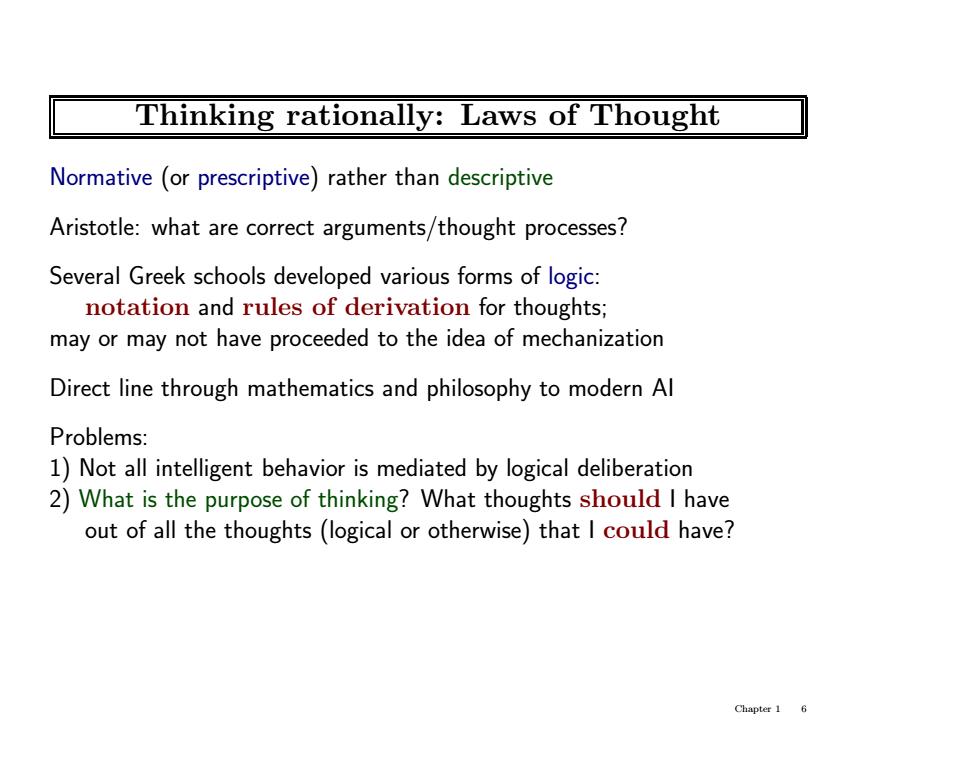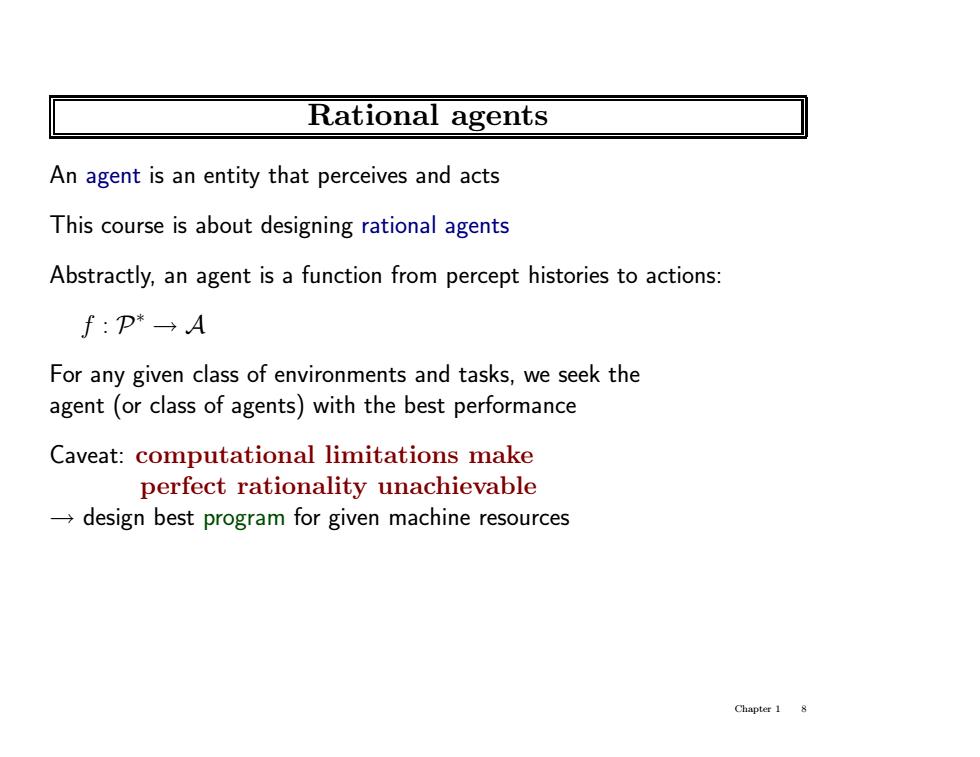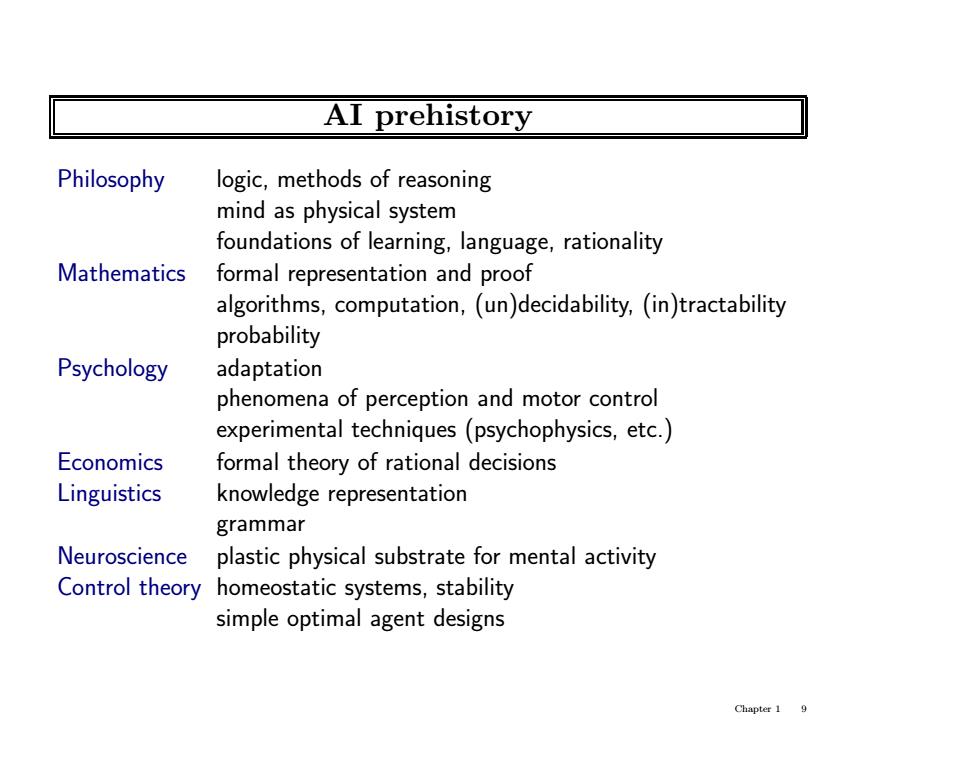
Thinking rationally:Laws of Thought Normative (or prescriptive)rather than descriptive Aristotle:what are correct arguments/thought processes? Several Greek schools developed various forms of logic: notation and rules of derivation for thoughts; may or may not have proceeded to the idea of mechanization Direct line through mathematics and philosophy to modern Al Problems: 1)Not all intelligent behavior is mediated by logical deliberation 2)What is the purpose of thinking?What thoughts should I have out of all the thoughts (logical or otherwise)that I could have? Chapter 1 6
Thinking rationally: Laws of Thought Normative (or prescriptive) rather than descriptive Aristotle: what are correct arguments/thought processes? Several Greek schools developed various forms of logic: notation and rules of derivation for thoughts; may or may not have proceeded to the idea of mechanization Direct line through mathematics and philosophy to modern AI Problems: 1) Not all intelligent behavior is mediated by logical deliberation 2) What is the purpose of thinking? What thoughts should I have out of all the thoughts (logical or otherwise) that I could have? Chapter 1 6

Acting rationally Rational behavior:doing the right thing The right thing:that which is expected to maximize goal achievement, given the available information Doesn't necessarily involve thinking-e.g.,blinking reflex-but thinking should be in the service of rational action Aristotle(Nicomachean Ethics): Every art and every inquiry,and similarly every action and pursuit,is thought to aim at some good Chapter 1 7
Acting rationally Rational behavior: doing the right thing The right thing: that which is expected to maximize goal achievement, given the available information Doesn’t necessarily involve thinking—e.g., blinking reflex—but thinking should be in the service of rational action Aristotle (Nicomachean Ethics): Every art and every inquiry, and similarly every action and pursuit, is thought to aim at some good Chapter 1 7

Rational agents An agent is an entity that perceives and acts This course is about designing rational agents Abstractly,an agent is a function from percept histories to actions: f:P*→A For any given class of environments and tasks,we seek the agent (or class of agents)with the best performance Caveat:computational limitations make perfect rationality unachievable design best program for given machine resources Chapter 1 8
Rational agents An agent is an entity that perceives and acts This course is about designing rational agents Abstractly, an agent is a function from percept histories to actions: f : P∗ → A For any given class of environments and tasks, we seek the agent (or class of agents) with the best performance Caveat: computational limitations make perfect rationality unachievable → design best program for given machine resources Chapter 1 8

AI prehistory Philosophy logic,methods of reasoning mind as physical system foundations of learning,language,rationality Mathematics formal representation and proof algorithms,computation,(un)decidability,(in)tractability probability Psychology adaptation phenomena of perception and motor control experimental techniques(psychophysics,etc.) Economics formal theory of rational decisions Linguistics knowledge representation grammar Neuroscience plastic physical substrate for mental activity Control theory homeostatic systems,stability simple optimal agent designs Chapter 1 9
AI prehistory Philosophy logic, methods of reasoning mind as physical system foundations of learning, language, rationality Mathematics formal representation and proof algorithms, computation, (un)decidability, (in)tractability probability Psychology adaptation phenomena of perception and motor control experimental techniques (psychophysics, etc.) Economics formal theory of rational decisions Linguistics knowledge representation grammar Neuroscience plastic physical substrate for mental activity Control theory homeostatic systems, stability simple optimal agent designs Chapter 1 9